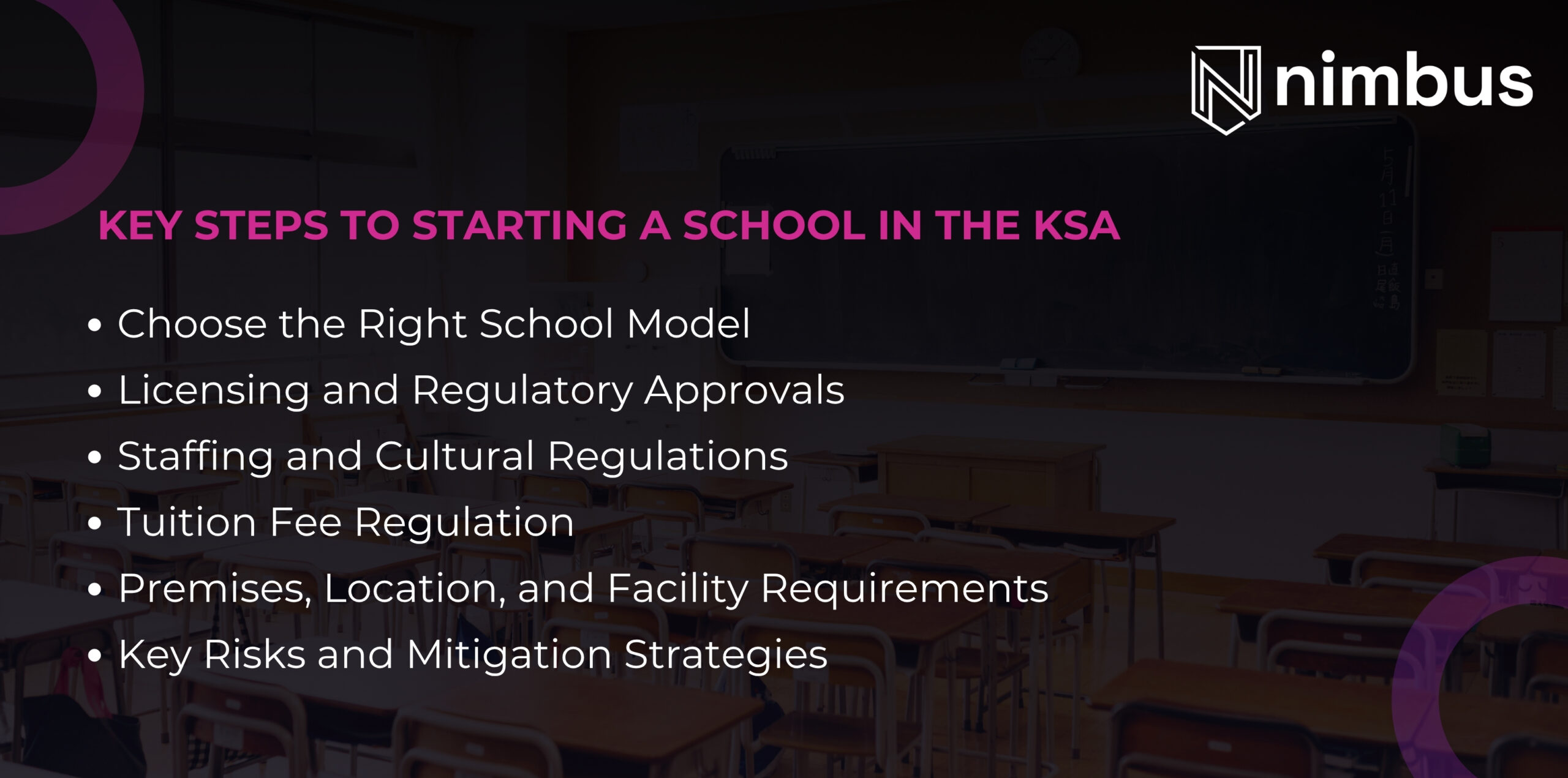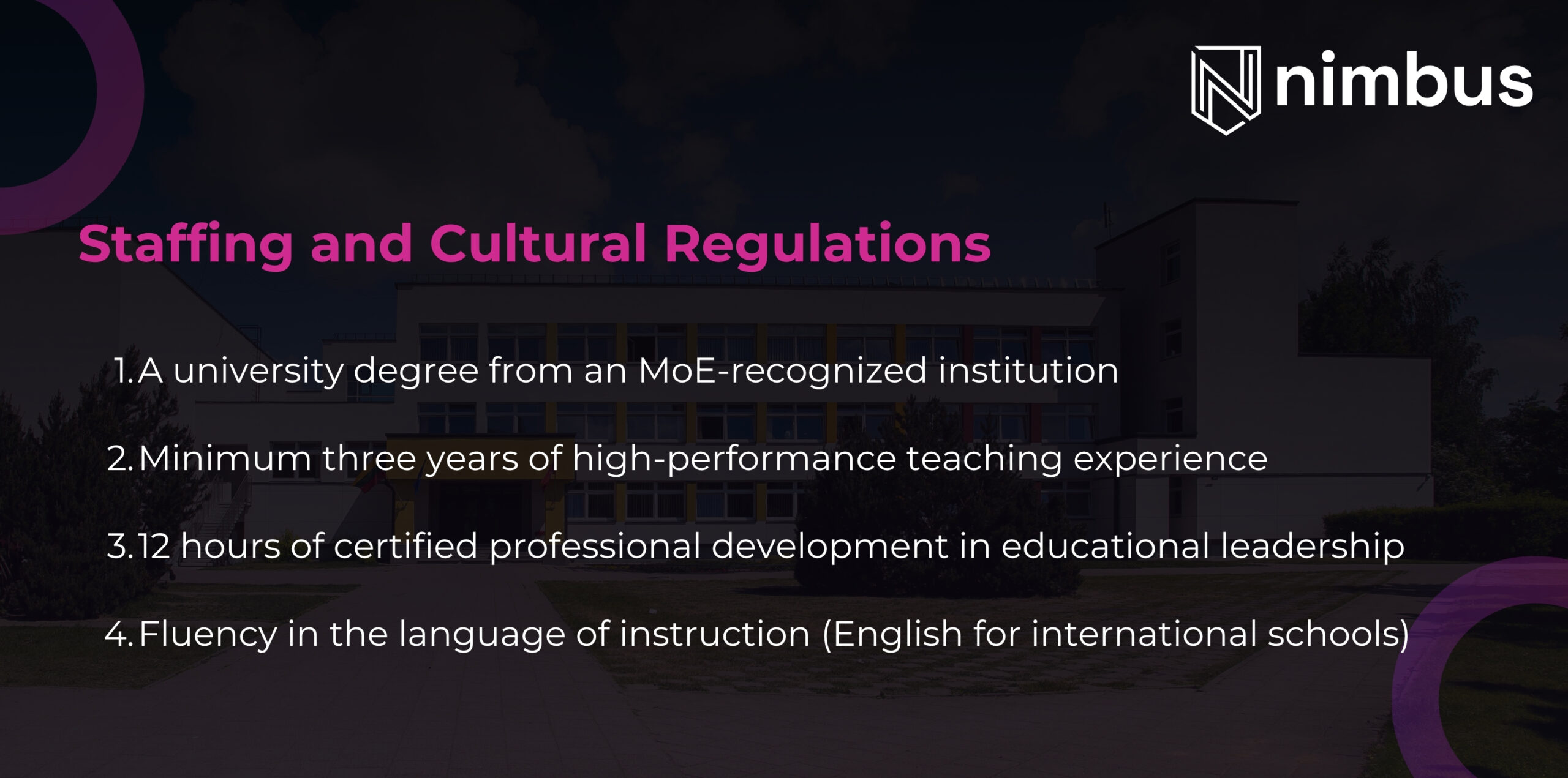Saudi Arabia’s education sector is undergoing drastic transformation under Vision 2030. With a national push to diversify the economy and empower human capital, the government is encouraging private investment in schools across the Kingdom.
This is especially evident in cities like Riyadh, Jeddah, and Khobar, where demand is growing rapidly due to the rise in foreign investment and the expatriate population.
The Public Investment Fund (PIF) has set a target to increase private school enrolment by 25% by 2030. For education providers and investors looking for business setup in the KSA, this presents a major opportunity, but only if the legal, cultural, and compliance frameworks are properly navigated.
This post gives you the insights into licensing, setup, and compliance.
KEY STEPS TO STARTING A SCHOOL IN THE KSA

Choose the Right School Model
The type of school you establish will determine the regulatory path you follow. Educational institutions in Saudi Arabia are classified into categories:
- Preschool: Ages 3–6, licensed by the Ministry of Education (MoE).
- Primary School: Grades 1–6, MoE license for national or international curriculum.
- Middle School: Grades 7–9, MoE license for curriculum.
- High School: Grades 10–12, MoE license for curriculum.
- Training Centres: STEM, language, or technical skills, licensed by the Technical & Vocational Training Corporation (TVTC).
- Tutoring Centres: Supplemental academic support, under MoE.
- Higher Education Institutes: Universities and post-secondary programs licensed by the National Center for Academic Accreditation (NCAAA).
Each school model must align with a curriculum type (national or international) and the target gender demographic (male, female, or mixed).
Select the Legal Structure
Choosing the correct legal structure is vital for ownership, operations, and regulatory purposes. Common legal structures include:
- LLC with 100% foreign ownership: Offers full control and limited liability. Ideal for international brands, though the approval process is more complex.
- Branch Office: Represents an extension of an existing educational entity. Maintains brand consistency but lacks local autonomy.
- Joint Venture with a Saudi partner: Offers local expertise and shared responsibilities but involves profit-sharing and potential governance challenges.
Additional factors to consider include bank account setup, expatriate teacher visas, tax obligations, and Saudization quotas.
Licensing and Regulatory Approvals
After obtaining the initial investment certificate from the Ministry of Investment (MISA) and the commercial registration from the Ministry of Commerce, you must secure further approvals from:
- Ministry of Education (MoE): Curriculum approvals and professional licensing of academic staff.
- Technical and Vocational Training Corporation (TVTC): For training centers.
- National Center for Academic Accreditation (NCAAA): For post-secondary institutions.
- Municipality and Civil Defense: For safety and fire code compliance.
- Health and Safety Authorities: For staff background checks and premises certification.
Staffing and Cultural Regulations
The MoE has clear guidelines for staffing, including academic qualifications and experience for leadership roles. A school principal, for example, must have:

- A university degree from an MoE-recognized institution
- Minimum three years of high-performance teaching experience
- 12 hours of certified professional development in educational leadership
- Fluency in the language of instruction (English for international schools)
Saudi Arabia permits female teachers in mixed early education settings but mandates gender segregation in higher grades. Female teachers are allowed to teach both genders up to Grade 6. Beyond that, schools must follow gender-segregated staffing.
The Saudization requirement mandates hiring Saudi teachers (around 30% depending on the school type and region). Expatriate staff must have a valid Iqama, meet labor law requirements, and undergo proper visa procedures, which may take up to two months.
Tuition Fee Regulation
All private schools must register their tuition fees with the MoE’s Tuition Fees Program portal. Schools must submit fee structures at least one year before the academic year starts. Any increases after this deadline will not be approved. Fee caps apply in lower-income areas to ensure education remains accessible.
Premises, Location, and Facility Requirements
School locations in Saudi Arabia are categorized into:
- Category A: High-density cities (e.g., Riyadh, Khobar)
- Category B: Special-status cities (e.g., Jeddah, Makkah)
- Category C: Other regions with lower population density
Each school type has specific building regulations:
- Nursery/Preschool: Ground + 1 floor
- Primary School: Ground + 2 floors
- Middle School: Ground + 3 floors
- High School: Ground + 3 floors
You can lease or build a facility, but leased buildings must comply with MoE and Civil Defense requirements. Site planning and approvals are crucial before making real estate decisions.
Key Risks and Mitigation Strategies
The table below outlines risks and recommended mitigation strategies:
- Delayed MoE Licensing: Leads to higher costs and operational delays.
- Mitigation: Hire a consultant to ensure documentation is complete.
- Non-Compliant Premises: Can lead to permit rejections.
- Mitigation: Study site planning standards in advance.
- Saudization Non-Compliance: Can result in fines or visa issues. Mitigation: Prepare a hiring plan for Saudi nationals.
- Curriculum Delays: Affects student enrolment and reputation.
- Mitigation: Align your curriculum with MoE guidelines and seek early approval.
Establishing a school in Saudi Arabia offers long-term growth potential, especially with the backing of Vision 2030 and the rising demand for private education. However, understanding the legal, cultural, and operational requirements is critical.
By working with expert consultants, school operators and investors looking for a business setup in Saudi Arabia can simplify the process of company formation, government approvals, staff onboarding, and ongoing compliance.



